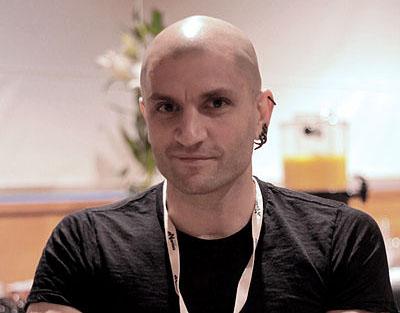Science fiction author China Miéville discusses ‘Embassytown’
China Miéville’s Embassytown draws readers into a richly rendered fantasy world underpinned by hyper real socio-political thought. (photo coutesy of Wikipedia).
China Miéville sourced the inspiration for his newest work, “Embassytown,” from ideas he had written about as a child.
He’s also working on a new book. Miéville’s forthcoming novel, Railsea is set for release May 15th.
“I tend to be very faithful to my own childish ideas,” Miéville said. “Sometimes they take a while to percolate through, but that one was sort of sitting there for about a quarter of a century until it was cooked and emerged.”
These childish ideas included the invention of a species called the Ariekei who have the linguistic ability to speak two words at once, creating layers of sound and meaning. In order to represent this double language, Miéville typed the Ariekeian speech as fractions with one line of words layered over another. The decision to write in this way is not purely aesthetic, Miéville devised the speech of the Ariekei as a commentary on the limits of language. While human languages engage symbols to represent ideas, in the Ariekeian language, there is no difference between a word and its referent.
“There are quite explicit arguments and debates between characters in “Embassytown,” on precisely this issue, on the notion of the limits of words and the limits of language,” Miéville said. “In fiction I have the luxury of being able to indulge my intense desire to represent the unrepresentable while knowing full well that it is impossible.”
Miéville’s interest in transcending limits has leaked into other realms of his life. In 2001, Miéville wrote his Ph.D. thesis on destabilizing the relationship between law and violence. In the same year, he ran for a Parliamentary seat for the Socialist Alliance party in the UK.
In the literary world, Miéville’s works have been placed within the genre of the “New Weird,” a group of young horror and fiction writers playing with fantasy, politics, and a steam punk aesthetic.
“New Weird was one of the storms in an online tea cup that raged a little bit less than a decade ago,” said Miéville.
He described the authors of New Weird fiction as individuals who engaged “the grotesque,” “the urban,” and “the fantastic,” in their writing.
Miéville’s interests in the realm of the bizarre, philosophy, and real-world politics all feed into his work.
“I think of my brain as a caldron of stuff all bubbling around and mixing up, or a washing machine getting jumbled up, and then I periodically reach in and pull certain things out. And I think that both the fiction and and the non-fiction [writing] pull stuff out of the same jumble, do so slightly differently, but it’s a shared set of concerns.”
Our coverage reaches millions each week, but only a small fraction of listeners contribute to sustain our program. We still need 224 more people to donate $100 or $10/monthly to unlock our $67,000 match. Will you help us get there today?
